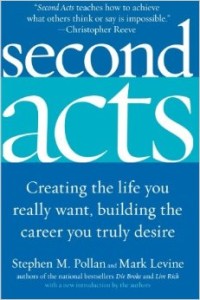
Second Acts: Creating the Life You Really Want, Building the Career You Truly Desire, by Stephen M. Pollan
In Second Acts, life coach Stephen Pollan counsels his readers through the complicated process of beginning a new career. Pollan directs the reader to get a notebook and begin writing down the practical and emotional obstacles they need to overcome in pursuit of their goals. Second Acts makes a convincing case for planning instead of wishing. The author suggests that the reader may balk at the idea of “taking what should be a romantic adventure and turning it into a prosaic project.” But if you follow his thorough guide for planning your second act, you’ll have an invaluable resource for keeping yourself on task.
My take
In each chapter, Pollan introduces exercises that will help get you started with the decision-making and planning process for your second act. With Pollan’s method, you’ll devote many journal entries to problem-solving.
Pollan offers exercises to get through both external and internal road blocks. For one exercise, Pollan guides you through an exhaustive assessment of your monthly expenditures, and instructs you to calculate all your potential sources of income while you’re transitioning to your new career. It’s tedious, but well worth the effort. With a clear picture of your financial situation, you’ll know exactly how much wiggle room you’ll have while starting over.
Later, Pollan focuses on internal conflicts. For example, maybe you’re worried the rest of the world considers you too old to start a new career. Several exercises ask you to articulate your fears in writing. Through a careful breakdown, these exercises will help you spot irrational flaws in your dire projections.
By the last chapter, you’ll have a self-authored document to refer to in times of uncertainty.
Critique
Pollan holds up celebrities like J.K. Rowling, Hillary Clinton, and George Foreman as examples of individuals with highly successful second acts. Some will take issue with these examples since they each have each enjoyed highly unusual career trajectories.
But while these public figures may have benefited from unlikely circumstances, they demonstrate what’s possible, an essential function of motivational writing. Furthermore, celebrities are not the focus of Second Acts. Pollan draws mostly on his experiences with his clients he met through his work as a life coach.
Conclusion
In his conclusion, Pollan points out that once the process of reinvention begins, it can be hard to stop. Once you see how easy it is to transform yourself, you’ll want to do it over and over again. This is perhaps the most encouraging part of all. You’re not just embarking on a single change in career – you’re starting a new lifestyle, a second act brimming with more promise than the first. Second Acts is a pragmatic tool for embarking on a new phase of life, offering the encouraging pep of a cheerleader and the practical wisdom of a seasoned coach.
